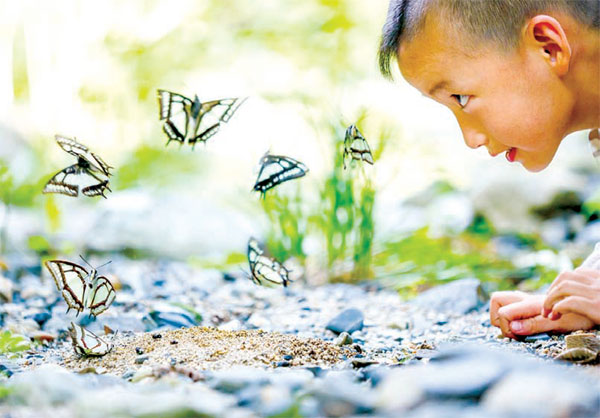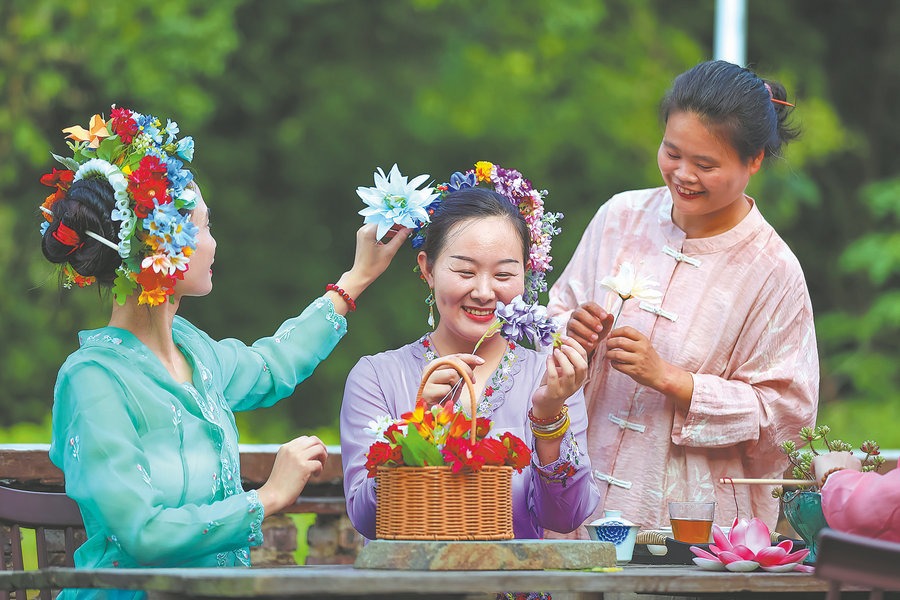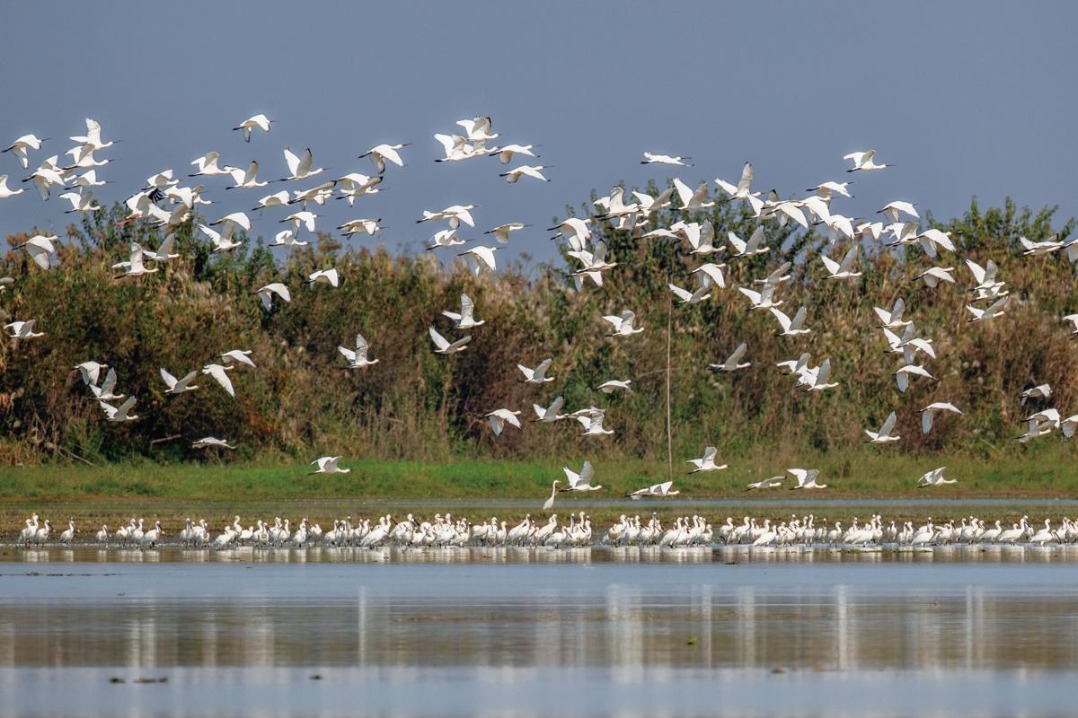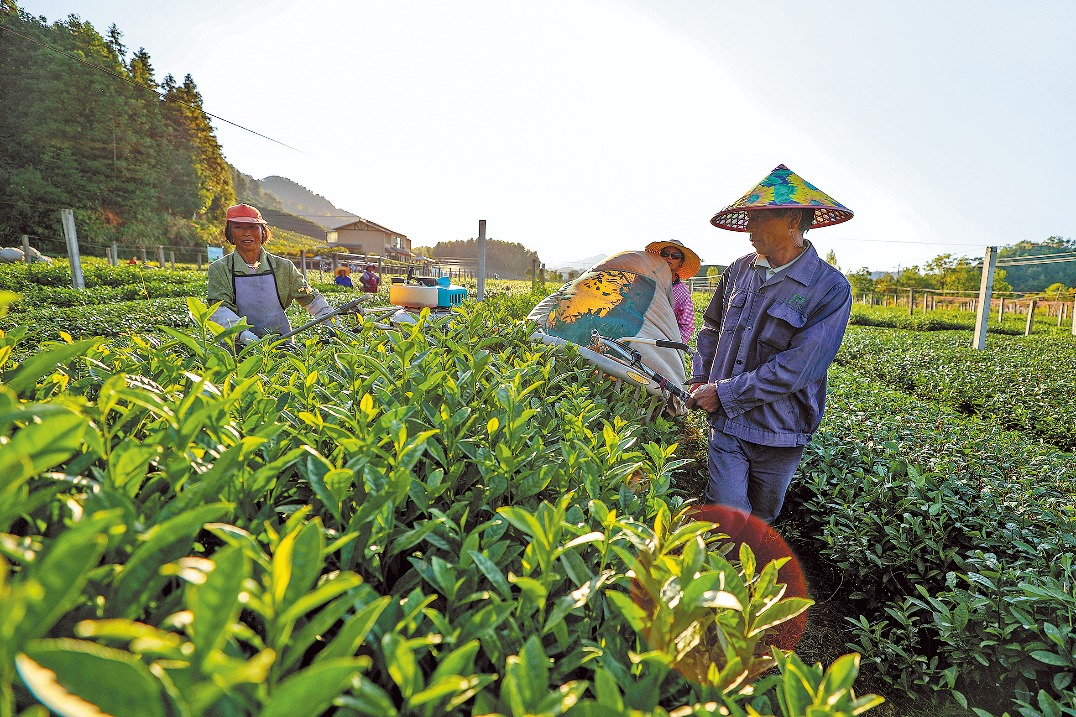Building a connection with Mother Nature

Chinese kids today are becoming increasingly interested in the natural world, thanks to the efforts of parents and educators who believe such exposure is necessary for a holistic learning experience during their growing up years
Climbing up the tree, lying on the grass to observe a butterfly emerge from its chrysalis and jumping along the ridges of farmlands are the most exciting childhood memories Wu Jinhai are trying to pass on to his son.
To get closer to nature, Wu even moved from an apartment in Hangzhou, Zhejiang province to run a guesthouse in Liangzhu New Town, a scenic spot in the countryside 16 kilometers from the city.
| Huang Yifeng, the founder of Nature Fun, talks to children during a day trip organized by his company. Provided to China Daily |
| Wang Qingshi shows off his research project on the different types of insect feet in Shanghai. Gao Erqiang / China Daily |
"I have always wanted to give my son a childhood full of freedom and excitement, which can be obtained by pursuing outdoor activities up in the hills, forests and along the streams," said Wu, who is also an insect enthusiast and a freelance photographer.
Every weekend since Wu's son Qiqi turned three years old, the father and son duo would head into the wilderness to chase the butterflies hovering above wild flowers.
Wu has since collected hundreds of butterfly specimens which are all displayed at his home. As a result of his upbringing, Qiqi has now left behind his shy disposition to become an outgoing and lively nine-year-old.
"Those trips have helped my son become more observant about nature, learn about the different lifeforms around us and express his unique understanding of them," said Wu, who now also works as a parttime teacher of natural science at a primary school.
Education experts say that children who grow up close to nature tend to be more creative and are more proactive in self-learning.
Wang Qingshi, an 11-yearold student of Beijing Shijingshan Yinhe Primary School, flew from the Chinese capital to Shanghai to attend the finals of the Global Natural History Day Competition 2016. Here, he showcased his unique methods of categorizing insects, winning the first prize for his efforts at the event.
As a child whose hobby is catching insects, Wang started carrying out research on the different shapes of insect feet after a cicada's foot was caught between the threads of his T-shirt about one year ago.
Together with a friend, Wang spent most of his leisure time catching hundreds of insects in Beijing, taking photos and documenting the differences between the feet of insects. He has now classified insect feet into four categories based on their shapes - double-hook, single-hook, stick-shaped and sucker hook.
Wang has even painted the feet of insects to create images, written journals and created interactive activities to show people how they can match insects with their different feet.
"I've learnt this aspect of insects that cannot be found in the textbooks and started thinking and conducting research independently to explore the natural world with creativity and curiosity," said Wang, who has a dream to become an entomologist.
Chen Hongcheng, Wang's tutor and a teacher at Beijing Yucai School, said that it is important and meaningful that kids today pay more attention to the world around them.
"Chinese parents are now making more efforts to expose their children to nature where they can exercise their curiosity and imagination, instead of being only concerned with examination results."
Another two participants in the competition, Zhang Yi and Yan Jiyao, shared their research results on birds at the competition in Shanghai. The pair of fourth-grade students attend the primary school attached to Southwest University in Chongqing.
"Birds are friends of us human beings. I want to explore how we can help them live and proliferate in nature with the least disturbance possible," said Yan, whose interest in birds developed after a trip to a bird park one year ago.
Yan and his classmate Zhang have since that trip been keenly observing birds and their relationship with the daily lives of humans. The pair eventually stumbled upon the realization that it would be necessary to create a balanced ecosystem for the creatures by controlling the bird population and planting more trees for them to live in. The two friends are planning to participate in the event again next year.
"I've widen my knowledge of birds, learned how to better express my thoughts and how to work as a team with those who have a same interest in birds," said Zhang of his experience.
Huang Yifeng, a Taiwanese ecological designer, is another advocate of getting kids out of their classrooms and residential blocks to parks, botanical gardens and zoos to see, touch and feel nature. To champion this cause, he founded Nature Fun in 2013. The company helps to organize outdoor activities within Shanghai for parents and children aged from six to 11.
He said that as more Chinese children are growing up in cities far away from the natural world, very few of them are able to name insects, flowers and tell the differences between vegetables.
Nature Fun's day trips take place once or twice monthly in parks, botanical gardens and zoos in the city. About 20 families, comprising one child who is accompanied by a parent, participate in each of the trips that are guided by Huang and his team, picking up leaves, listening to birds chirp and touching the insects.
Every day trip features a different theme, ranging from insects to birds or other animals. Huang would always give a short introductory lecture regarding the theme before the group sets off.
"I use storytelling methods as well as some handmade toys and props to get the children interested in the topic during the indoor warm-up session," said Huang.
During the summer holidays, the length of the explorative camps is extended to a week, while the location is changed from the city to the countryside.
"I am just acting as a catalyst for these lovely children to turn on their talents and explore the beauty in daily life," said Huang.
yuran@chinadaily.com.cn

| Wu Jinhai and his son Qiqi often spend quality time together in the countryside learning about nature. The father said this exposure to natural life has helped his son become more outgoing. Photos Provided to China Daily |
(China Daily USA 09/02/2016 page5)
Today's Top News
- Xi extends congratulations to plenary session of China-Russia friendship committee
- China plays a vital role in SCO's green transition
- Beijing warns Manila of 'all consequences'
- World needs right WWII narrative
- Military parade not a demonstration of bloc confrontation
- New 1st-tier cities gain ground in talent battle

































